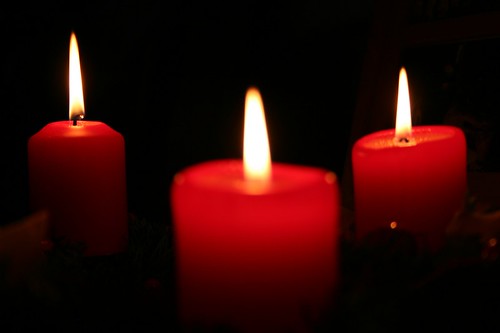
If you have kept an Advent wreath this Advent, this week you lit the pink candle. Each candle has a different theme. The first two candles were hope and peace. Next week’s candle is love. This week is joy.
Joy is a somewhat odd note to strike in the midst of a somber season like Advent. And this year, bringing up joy seems like a cruel joke, especially to those who are having extreme sorrow. But see what the prophet Zephaniah says:
Sing aloud, O daughter Zion;
shout, O Israel!
Rejoice and exult with all your heart,
O daughter Jerusalem!
The LORD has taken away the judgments against you,
he has turned away your enemies.
The king of Israel, the LORD, is in your midst;
you shall fear disaster no more.
On that day it shall be said to Jerusalem:
Do not fear, O Zion;
do not let your hands grow weak.
The LORD, your God, is in your midst,
a warrior who gives victory;
he will rejoice over you with gladness,
he will renew you in his love;
he will exult over you with loud singing
as on a day of festival.
I will remove disaster from you,
so that you will not bear reproach for it.
I will deal with all your oppressors
at that time.
And I will save the lame
and gather the outcast,
and I will change their shame into praise
and renown in all the earth.
At that time I will bring you home,
at the time when I gather you;
for I will make you renowned and praised
among all the peoples of the earth,
when I restore your fortunes
before your eyes, says the LORD.
- Zephaniah 3:14-20 (NRSV)
The Bible doesn’t just commend joy as a good thing, but forces the issue by commanding joy. Again and again we are told, “Rejoice!” I will not minimize the difficulty in obeying this command. However, the fact that joy is required of us should make us stop and ask about the nature of joy.
What is Joy?
Once upon a time, it was common to speak of how joy, like love, is not an emotion. We choose to be joyful. In every circumstance we must exercise our will and make the decision to be joyful. This misunderstands the nature of what it means to be human.We are not mere “wills” walking about making decision all over the place. We are whole people, with bodies, with emotions. It is silly to speak of both love and joy as being feeling- or emotion-less.
This pushes us right to the edge —how in the world can we feel joy when our world has been crushed? When tragedy strikes, disasters overwhelm, how can we choose to be joyful?
Planting Seeds of Joy
Yet there are disciplines we can practice that will lead us into joy. Gratitude is one such practice that can help nurture joy in us. Thankfulness is a very large door that allows access to joy. Likewise, generosity is a seed of joy. By giving of ourselves, we plant something that will grow into joy. For that matter, when things are going well, choosing to rejoice builds in us the capacity to be joyful when things are not going well. Week by week, joining with God’s people in worship strengthens our “joy muscles.”
Above I used the agrarian metaphor of planting seeds intentionally because it highlights the essential nature of joy. We have our part to play; we plant the seeds. But every farmer knows that they have no power to make the seed grow into the desired crop. Joy is beyond our ability to produce.
This might be one of the primary reasons that joy is included in the season of Advent. The only way to get true joy is by God coming among us. The darkness of Advent reminds us of our limitations. We can no more make ourselves be joyful in the sorrow of our lives than make the sun rise in the morning. But rise the sun does, and Christmas is all a about God coming among us, the great “sunrise,” so we wait in hope for our joy to be made complete.
For the Emerging Scholars Network’s growing Advent collection click here.
Charlie Clauss works with Intervarsity’s Graduate Student and Faculty Ministry in Minnesota and the Dakotas.

Leave a Reply